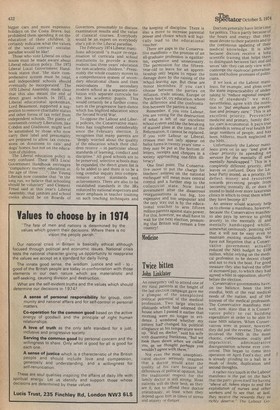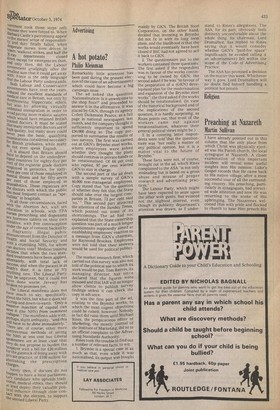Medicine
Twice bitten
John Linklater
An emergency call to attend one of my rural patients at the height of the last election campaign gave me a glimpse of the unexploited political potential of the medical profession. Two large election platcards which had adorned the house when I passed it earlier that morning were no longer in evidence. I wondered whether my patient had changed his political allegiance as his temperature went up. "Well no, doctor," said his wife with disarming frankness, "but we took them down when we called you, as we thought perhaps you wouldn't agree with them."
Not even the most unsophisticated elector seriously imagines that a doctor would alter the quality of his care because of differences of political opinion, but the traditional respect for the family doctor is still strong. Most patients will do their best, as they see it, not to offend their doctor gratuitously; at least when they depend upon him in times of stress and anxiety or danger.
Spectator October 5, 1974 Doctors generally have little time for politics. This is partly because of the hours and energy that they must devote to their patients and to the continuous updating of their medical knowledge. It is also because doctors receive a long scientific training that helps them to distinguish between fact and old wives' tale: they can only view with contempt the equivocal generalisadons and hollow promises of politicians. If we look at the Labour manifesto, for example, and gloss over the inane impracticability of undertaking to "reduce regional inequa lity of standards" we may, nevertheless, agree with the inten tion to "put emphasis on preven
tion and primary care." This is an excellent priority. Preventive medicine and primary, family doc tor, care is economical. It pays true .dividends in terms of real health for large numbers of people, and has been, hitherto, much neglected in the NHS. Unfortunately the Labour manifesto goes on to say "and give a clear priority to spending on services for the mentally ill and mentally handicapped." This is a completely different priority, and leaves us confused. Does the Labour Party intend, as a priority, to deflect money and resources towards preventing people from becoming mentally ill, or does it intend to build ever more luxurious clinics in which to treat them when they have become ill?
An answer wbuld scarcely help us to choose a manifesto, however, because the Conservative manifes
to also pays lip service to giving priority to the mentally ill and mentally handicapped whilst, somewhat ominously, pointing out that it will not be easy even to maintain existing standards. We
have not forgotten that a Conservative government actually
reduced the NHS budget by E100 million, whilst relying on the medical profession to be decent chaps and not to rock the boat. For good measure they also halved the offer of increased pay, to which they had agreed whilst in opposition, shortly before the election.
Conservative governments have, on the balance, been the less mindful, both of the real medical needs of the nation, and of the interest of the medical profession.
The Conservative manifesto may well, now, state that it is Conservative policy to cut building expenditure in order to be able to raise NHS salaries. When Conservatives were in power, howeyer, they did just the reverse. They also involved the NHS in the most chaotic, cumbersome, costly and impractical. administrative disorganisation scheme ever conceived. This began to come into operation on April Fool's day, and is already grinding to a halt in a mush of doubt, duplication and second thoughts.
A rather nice touch in the Labour manifesto is the pat on the back that the party gives itself for having "above all, taken steps to end the exploitation of nurses and other workers and to see that, at last, they receive the rewards they so richly deserve." The Labour Go
Spectator Qpectator October 5, 1974 vernment took those steps only because they were forced to. When Barbara Castle's patronising appeal to the nurses' sense of responsibilitY and duty finally failed, when desperate nurses were driven to token, walkout strikes, and half the ,,X-ray, departments closed down except for emergencies then, and only then, did the Labour government grudgingly offer the smallest sum that it could get away With. Force is the only language that the Labour Party understands. Both Labour and Conservative governments have, over the years, reduced the excellent standards of medical care in Britain, not only by overthrowing Hippocratic ethics, hut also by allowing virtually unlimited immigration in order to avoid Paying more realistic salaries whiCh would have retained British trained doctors. It must be stated that many immigrant doctors are of high quality, but many more could never pass the basic, qualifying exarninations considered necessary for 13ritish graduates, while many 40 not even speak English. It is absurd that Britain should lave to depend on the underdeveoped countries for eighty-five per cent of the registrar grade doctors einPloyed in geriatrics, for sixtythree per cent of those employed in Mental illness and for fifty-seven Per cent of those employed in anaesthetics. These registrars are the doctors with which the public has most frequent contact as "specialists" in hospitals. In all these circumstances, faced With the Abortion Act, with sex education in schools, with FPA nurses prescribing and dispensing seX hormone tablets on their own initiative, with free contraception tinder the age of consent backed by a flagrantly illegal public announcement from the Director of Health and Social Security and with a crumbling NHS, for whom Can doctors vote? Medical training ,dictates that when the two standard treatments have been applied, alternately, with total lack of success, and when the patient is at death's door, it is time to try anything new. The Liberal Party LthaY be unproven, but it could not have done worse. Jeremy has woken no promises yet. The Liberal manifesto does not have much to say, specifically, about the NHS, but what it does say is crisp and down-to-earth. "Only a Massive injection of capital can SQve it (the NHS) from imminent c°11apse."The manifesto adds with. Perhaps, slight ambiguity, "and this Will have to be done immediately. _ " there are, of course, other more controversial methods of saving the NHS at less cost but Liberal sPokesmen are at least .clear that ,tbey do not propose to burden the ,`axPayer with a bill for E20 million ,or the gimmick of doing away with Private practice, or £100 million for abolishing the prescription charges.
k Sur elY then, if doctors do not naPpen to have a local parliamen tar): candidate who upholds tradi
tional, medical ethics, they should at least deploy their valuable poli
tical influence through close contact with the electors, to support the untried Liberal Party.

































 Previous page
Previous page